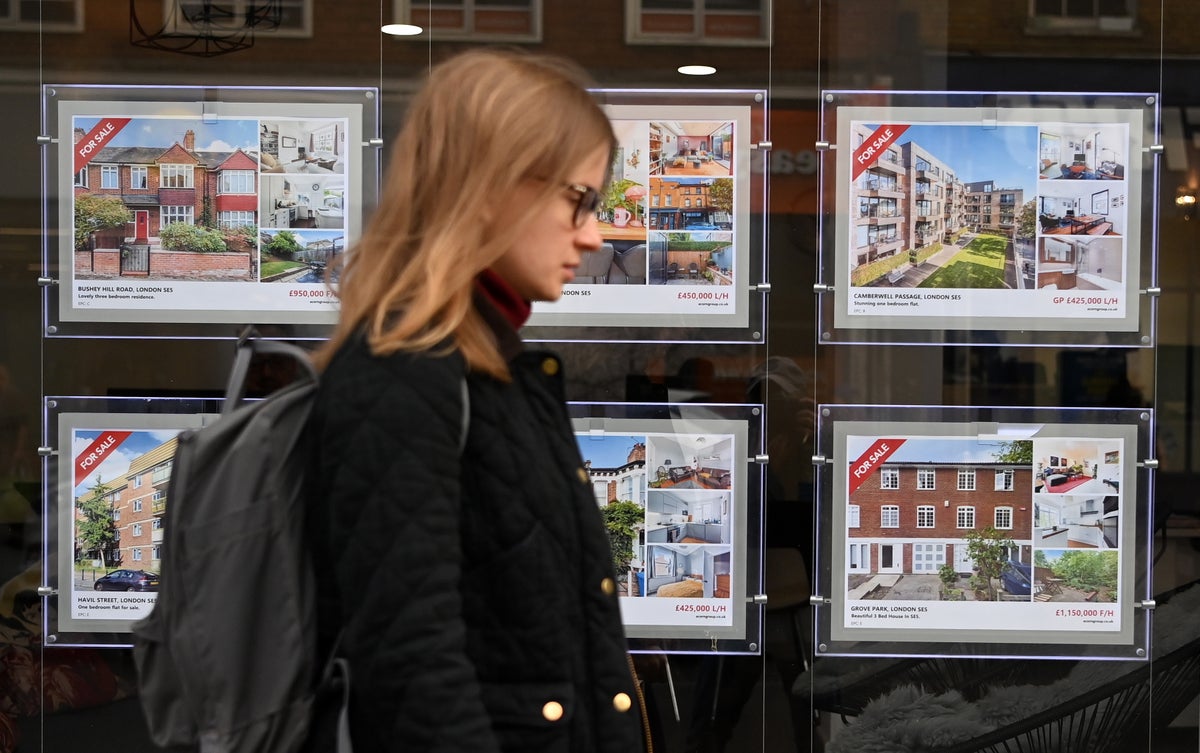
House prices in the UK fell at the sharpest annual rate in 14 years in August, according to an index.
House prices fell by 5.3 per cent annually in August, taking the average property value to £259,153, Nationwide Building Society said, marking the biggest annual percentage drop since July 2009.
Property values fell by 0.8 per cent month-on-month in August 2023.
It came as seperate data showed Britain’s troubled manufacturing sector shrank at its fastest rate since the early days of the Covid-19 pandemic last month.
According to the influential S&P Global/CIPS UK Manufacturing PMI survey the sector has now shrunk for 13 straight months.
The survey's reading dropped from 45.3 in July to 43.0 in August, it was revealed on Friday.
It means that it has been 39 months since the survey scored so low for the manufacturing sector.
Discounting the pandemic lockdown in the spring of 2020 the survey has not scored this poorly since the 2009 financial crisis.
Nationwide said house prices are now 5.3 per cent, or around £14,600, typically below their August 2022 peak.
The vast majority of existing borrowers should be able to weather the impact of higher borrowing costs— Robert Gardner, Nationwide Building Society
Robert Gardner, Nationwide’s chief economist, said: “August saw a further softening in the annual rate of house price growth to minus 5.3 per cent, from minus 3.8 per cent in July, the weakest rate since July 2009.”
He said the softening “is not surprising, given the extent of the rise in borrowing costs in recent months, which has resulted in activity in the housing market running well below pre-pandemic levels.
“For example, mortgage approvals have been around 20 per cent below the 2019 average in recent months and mortgage application data suggests the weakness has been maintained more recently.
Mr Gardner said a “relatively soft landing is still achievable”, providing broader economic conditions evolve in line with expectations.
He added: “In particular, unemployment is expected to remain low and the vast majority of existing borrowers should be able to weather the impact of higher borrowing costs given the high proportion on fixed rates, and where affordability testing should ensure that those needing to refinance can afford the higher payments.
“While activity is likely to remain subdued in the near term, healthy rates of nominal income growth, together with modestly lower house prices, should help to improve housing affordability over time, especially if mortgage rates moderate once (the Bank of England base rate) peaks.”
Mr Gardner added that property purchases using cash have been “remarkably resilient, while purchases involving a mortgage have slowed much more sharply”.
Home-mover completions with a mortgage in the first half of 2023 were a third lower than 2019 levels, while first-time buyer numbers were around a quarter lower, he said.
Buy-to-let purchases involving a mortgage were nearly 30 per cent down. By contrast, cash purchases were up by 2 per cent, he said.
“The relative weakness of mortgage activity reflects mounting affordability pressures as a result of the sharp rise in mortgage rates since last autumn, which would not have affected cash buyers,” he said.
“Indeed, a first-time buyer earning the average wage and buying a typical first-time-buyer property with a 20 per cent deposit would now see their monthly mortgage payment absorb over 40 per cent of their take-home pay (with a mortgage rate of 6 per cent) – well above the long-run average of (around) 29 per cent.”
There are signs that buyers are looking towards smaller, less expensive properties, he added.
We expect pressure on pricing and transaction volumes to continue through this year and next— Chris Druce, Knight Frank
Chris Druce, senior research analyst at estate agent Knight Frank, said: “The Bank of England’s rate-setting decision later this month, and the messaging around it, will be a key moment for the UK housing market.
“If, as believed, we are near the peak of the rate-rising cycle we can expect buyer confidence to improve in the second half of this year, after a challenging period that has seen people’s spending power reduced and activity slow.
“Surety about rates will allow buyers to plan more effectively, although affordability will continue to be stretched and we expect pressure on pricing and transaction volumes to continue through this year and next.
“However, demand should prove more resilient than expected given the shock-absorber effect of strong wage growth, lockdown savings, the availability of longer mortgage terms, flexibility from lenders and the popularity of fixed-rate deals in recent years.”
Tomer Aboody, director of property lender MT Finance, said: “The declining number of transactions, combined with negativity in the market, is resulting in a softening of property prices, a trend which has been evident for several months.
“Constant interest rate rises are making affordability difficult for buyers who are trying to move, with many having little option but to wait until rates settle.”
Christian Duncan, managing director of the Manchester Mortgage Centre said: “Since the mini-Budget and with all the recent rate increases, first-time buyers have changed their mindsets and are no longer looking to borrow as much as possible but are coming forward with a maximum spend per month and looking to find a property that is in line with their budget.”
David Stirling, independent financial adviser at Belfast-based Mint Mortgage & Protection said: “Many borrowers are looking at extending their mortgage terms to try to help them manage their monthly mortgage payments. With this in mind, HSBC extending mortgage terms to 40 years is a very welcome criteria change.”
Simon Gerrard, managing director of London-based Martyn Gerrard estate agents, said: “August is typically a slower month as people prioritise their summer holidays over house hunting.”
Nicky Stevenson, managing director at estate agent group Fine & Country said: “As we come out of the summer, demand is expected to build again, and many sellers are looking to begin marketing their home in September.”







